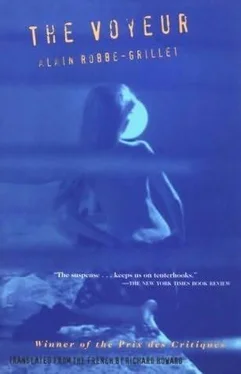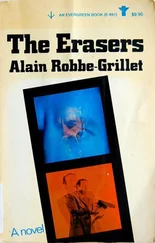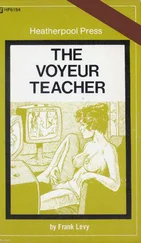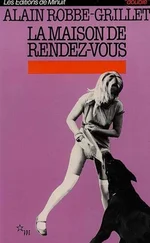Mathias had arrived that very morning by the steamer, intending to spend the day on the island; he had immediately made efforts to procure a bicycle, but while waiting until one was available he had begun his rounds at the harbor, contrary to his original plans. Since he had not succeeded in selling any of his merchandise—notwithstanding its excellent quality and moderate price—he had doggedly called at all (at almost all) the houses along the road where his chances had seemed somewhat better. He had wasted still more time doing this—so much time that once back at the crossroads he had suddenly become alarmed at how late it had grown and had decided it would be wiser to continue straight ahead instead of making another detour all the way to the farm. To add to his troubles, the gearshift of the bicycle he had rented at the café-tobacco shop was not working properly and…
The old woman was going to pass without speaking to him. She had stared at him and then looked away as if she did not know him. At first he felt a kind of relief, then wondered if the contrary would not have been preferable. Finally it occurred to him that perhaps she had pretended not to recognize him on purpose, though he could not see why she should show any reluctance to gossip with him for a few minutes, or in any case to say good morning, if nothing more. On the off chance, he decided to speak first, in spite of the considerable effort it cost him at this particular moment. That way, at least, he would know how far he could go. He emphasized the grimace he had begun, imagining it resembled a smile.
But now it was too late to attract the woman’s attention by a mere change of expression. She had already passed between the dried corpse of the frog and the rounded extremity of the telegraph pole. Soon she would be far behind him, and it would take a human voice to keep her from continuing toward still more inaccessible regions. Mathias clenched his right hand around the polished metal of the handlebars.
A sentence jolted out of his mouth—obscure and overlong, too sudden to be altogether friendly, grammatically incorrect—in which he could make out, nevertheless, the essential formulas: “Marek,” “good morning,” “not recognized.” The old woman turned toward him without understanding what he had said. He managed to repeat the indispensable words more calmly, completing them by giving his own name.
“Well, well!” the old woman said, “I didn’t recognize you.”
She thought he seemed tired, “funny-looking” was how she put it. At the time of their last meeting, more than two years ago (the last time she had been in town, at her son-in-law’s ), Mathias was still wearing his little mustache…. He protested: he had never worn a mustache, or a beard either. But the old woman did not seem convinced by his insistence. To change the subject, she asked him what he was doing so far from town: there wasn’t much chance of his finding many electric appliances to repair—especially out here in the country where almost everyone used oil anyway.
Mathias explained that he was no longer an itinerant electrician. He was selling wrist watches these days. He had arrived on the steamer this very morning, and planned to spend the day. He had rented a bicycle, which unfortunately was not working so well as its owner had claimed it would. (He showed his grease-stained hand.) Besides, he had wasted so much time getting as far as the crossroads that when he…
Madame Marek interrupted him. “That’s right, you wouldn’t have found anyone at the house.”
The salesman let her talk on. She told him about her daughter-in-law’s departure for a fifteen-day trip to the mainland. And her eldest son would be in town all morning (the other two were sailors). Josephine had lunch at lier family’s on Tuesdays. Her grandchildren didn’t come home from school until twelve-thirty, except the eldest boy, who worked as an apprentice at the bakery and didn’t come home until evening. That boy wasn’t all there: why only the week before…
Mathias might have met the father, or the son, for he had begun his rounds at the harbor, contrary to his original plans. Relying more on his country customers, he had then doggedly called at all the houses along the road. Here as in town he had wasted still more time. He hoped for a more favorable reception at the Marek’s at least—he wouldn’t have missed visiting his old friends for anything; he had been disappointed to find the house closed and apparently empty; he had been obliged to leave without news of the family—of Madame Marek, her children, her grandchildren. He was wondering what their absence—everyone’s—could mean at such an hour, when most people are at home eating dinner. How could he help worrying over this incomprehensible solitude?
His ears, straining for a clue, hear nothing; even his breathing, that might break the silence, stops of its own accord. Yet he cannot hear the slightest noise inside. No one speaks. Nothing moves. Everything is dead still. Mathias leans toward the closed door.
He knocks again, this time with his ring, on the door panel which echoes as if he had struck an empty box; but he already knows how futile such a gesture is: if someone were at home the door would be open on a sunny day like this, and probably the windows too. He lifts his head toward those on the first floor; not a sign of life there either—shutter pushed open, lifted curtain falling back, silhouette disappearing—not even that premonitory confusion of the gaping window recesses where someone leaning out might have just disappeared, or someone who has suddenly appeared is going to lean out.
Propping his bicycle against the wall, he takes a few undecided steps on the beaten earth floor of the courtyard. He reaches the kitchen window and tries to look in, but it is too dark inside to see anything. He turns back toward the door by the same way he came into the courtyard, walks two or three yards in that direction, stops, turns around and walks in the opposite direction, glances again at the door and at the closed shutters of the ground-floor windows, continuing this time as far as the garden fence. The lattice-gate is locked too.
Returning to the house, he approaches what must be the kitchen window and checks to see if the heavy wooden shutters are bolted or merely drawn: useless, in that case, trying to see anything inside.
He returns to where he left the bicycle. There is nothing else to do but leave.
He is very disappointed. Here, at least, he was hoping for a more favorable reception. All the way to the farm his spirits had been rising at the prospect of a visit to his old childhood friends, never suspecting they could all be away from home at once.
Ever since that morning—ever since the night before—his spirits had been rising at the prospect of a visit to his old childhood friends; he told himself how surprised they would be to see him—he had never revisited the island, and after all he had been born here. He had already seen Robert Marek’s four children on several occasions, however, when they were spending their short vacations with their uncle in the city, only a few doors away from his own house. They must have grown since the last time, there was a good chance he might not even recognize them now, but he would make sure that their parents didn’t notice that. Perhaps he would be invited to stay to lunch; that would certainly be more pleasant than gobbling down the two sandwiches he had brought along for a snack; the heat had turned them to jelly in the left pocket of his duffle coat.
The heat was certainly becoming excessive. And the road was growing steeper, obliging him to slow down. He stopped twice at isolated houses along the road. Realizing at once that he would sell nothing, he left them almost immediately. When he reached the fork to the mill, he continued straight ahead: his information about the people there left him no hope of selling even the cheapest of his wares; it was useless going there under such conditions; he had wasted enough time that way.
Читать дальше












